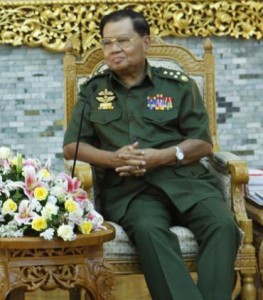Credible evidence: Myanmar is acquiring N-weapon components

Sai Thein Win, who had fled the country recently, says he visited key installations and attended meetings at which the new technology was demonstrated.
The evidence brought by him includes hundreds of photos and documents like technical drawings of bomb-reduction vessel, which is chiefly used in the making of uranium metal for fuel rods and nuclear-weapons components. He also released a document purporting to show a Burmese government official ordering production of the device, as well as photos of the finished vessel.
Other photographs show Burmese military officials and civilians posing beside a vacuum glove box, which is used in the production of uranium metal. According to Sai Thein Win, Myanmar junta is engaged in various phases of a nuclear-weapons programme from uranium mining to work on advanced lasers used in uranium enrichment. Some of the machinery appears to have been of Western origin.
Experts, who studied the evidence, opine that there are enormous gaps in Myanmar’s technical know-how and as such it is unlikely to make N- bomb quickly.
Dissident group Democratic Voice of Burma commissioned the analysis of the ‘evidence’ and provided copies of the analysis to al-Jazeera, The Washington Post and a few other news outlets.
Though there here have been numerous allegations in the past about secret nuclear activity by the Junta, such accounts were based largely on ambiguous satellite images and uncorroborated stories by defectors.
The analysis concludes with “high confidence” that Myanmar is seeking nuclear technology. It is only for nuclear weapons and not for civilian use or nuclear power.”
“The intent is clear, and that is a very disturbing matter for international agreements,” Washington Post reported on May 4 quoted the report, co-authored by Robert E. Kelley, a retired senior U.N. nuclear inspector with Democratic Voice of Burma researcher Ali Fowle.
The report notes that the Burmese scientists appear to be struggling to master the technology and that some processes, such as laser enrichment, likely far exceed the capabilities of the impoverished, isolated country.
This assessment appears credible, Washington Post quoted a nuclear weapons analyst who reviewed the report. “It’s just too easy to hide a program like this,” Joshua H. Pollack, a consultant to the U.S. government, said.
-
Book Shelf
-
 Book Review
DESTINY OF A DYSFUNCTIONAL NUCLEAR STATE
Book Review
DESTINY OF A DYSFUNCTIONAL NUCLEAR STATE
- Book ReviewChina FO Presser Where is the fountainhead of jihad?
- Book ReviewNews Pak Syndrome bedevils Indo-Bangla ties
- Book Review Understanding Vedic Equality….: Book Review
- Book Review Buddhism Made Easy: Book Review
- Book ReviewNews Elegant Summary Of Krishnamurti’s teachings
- Book Review Review: Perspectives: The Timeless Way of Wisdom
- Book ReviewNews Rituals too a world of Rhythm
- Book Review Marx After Marxism
- Book Review John Updike’s Terrorist – a review
-
-
Recent Top Post
-
 NewsTop Story
What Would “Total Victory” Mean in Gaza?
NewsTop Story
What Would “Total Victory” Mean in Gaza?
-
 CommentariesTop Story
The Occupation of Territory in War
CommentariesTop Story
The Occupation of Territory in War
-
 CommentariesTop Story
Pakistan: Infighting in ruling elite intensifies following shock election result
CommentariesTop Story
Pakistan: Infighting in ruling elite intensifies following shock election result
-
 CommentariesTop Story
Proforma Polls in Pakistan Today
CommentariesTop Story
Proforma Polls in Pakistan Today
-
 CommentariesTop Story
Global South Dithering Away from BRI
CommentariesTop Story
Global South Dithering Away from BRI
-
 News
Meherabad beckons….
News
Meherabad beckons….
-
 CommentariesTop Story
Hong Kong court liquidates failed Chinese property giant
CommentariesTop Story
Hong Kong court liquidates failed Chinese property giant
-
 CommentariesTop Story
China’s stock market fall sounds alarm bells
CommentariesTop Story
China’s stock market fall sounds alarm bells
-
 Commentaries
Middle East: Opportunity for the US
Commentaries
Middle East: Opportunity for the US
-
 Commentaries
India – Maldives Relations Nosedive
Commentaries
India – Maldives Relations Nosedive
-
AdSense code




















